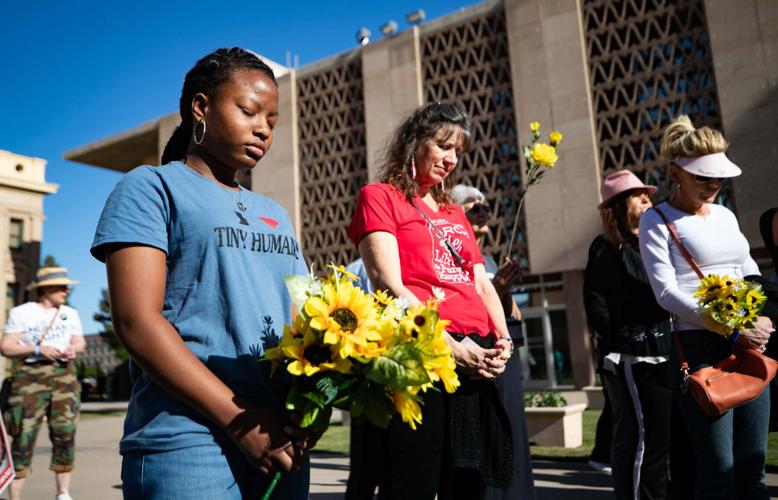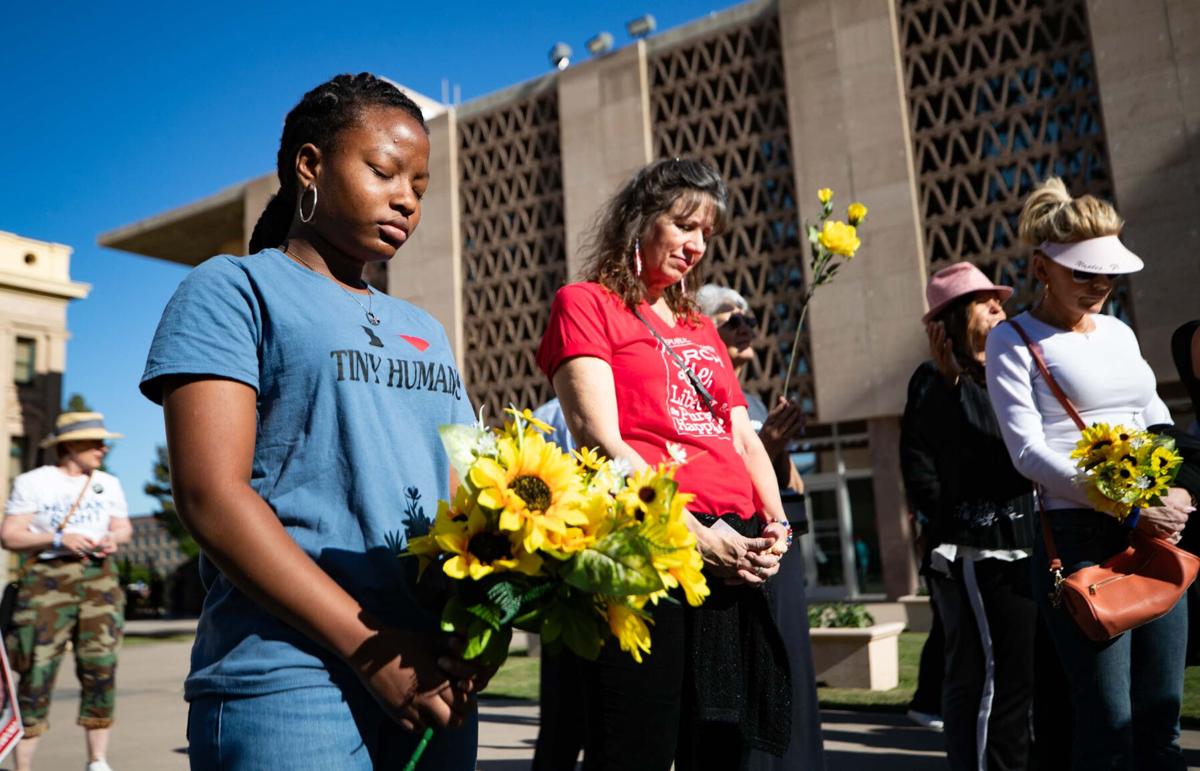PHOENIX — State senators will vote whether to repeal an Arizona law dating back to 1864 that outlaws abortion except to save the life of the mother. And there appear to be sufficient votes to scrap it.
Sen. Anna Hernandez, D-Phoenix, convinced two Republicans Wednesday to support her move to introduce the repeal measure despite the deadline for new bills having passed weeks ago. With all 14 Democrats in support, that gave her the necessary votes in the GOP-controlled, 30-member chamber to sidestep the rules.
There appear to be the necessary Senate votes to repeal the old law, as Republicans T.J. Shope of Coolidge and Shawnna Bolick of Phoenix want to do so. That would leave only a more recent law on the books that allows women to have an abortion until the 15th week of pregnancy.
“That’s where I think it should be,” Shope said.
He said that’s also what most people find as a “reasonable compromise” between virtually no abortions and a proposed ballot initiative. That measure would allow abortions in all cases up until fetal viability, generally considered between 22 and 24 weeks of pregnancy, but with exceptions allowing the procedure later when “necessary to protect the life or physical or mental health of the pregnant individual.’’
There won’t be quick action, however: Because of Senate rules, the chamber’s final vote on a repeal couldn’t occur before there are two more meetings of the Senate. And senators voted to go home until next Wednesday.
The bigger question is whether the Republican-controlled House will go along.
Rep. Stephanie Stahl Hamilton, D-Tucson, sought to force a vote there Wednesday on an identical measure to repeal the 160-year-old law, which subjects doctors to a prison term of up to five years for performing an abortion. But the Republican majority used House rules — twice — to block even debating the issue.
Only one House Republican — Rep. Matt Gress of Phoenix — sided with Democrats in seeking to put the issue up for a vote. But with all the other Republicans in opposition, that move failed on a 30-30 tie vote.
Gress later insisted the issue eventually will be debated.

Mayra Rogriduez, former director for three Arizona Planned Parenthood locations, speaks during a prayer vigil held by Right to Life outside the Arizona State Capitol on April 17.
“There are Republicans who want to repeal the territorial-era ban,’’ he said. “That vote will happen and it will pass. And the bill will be sent to the governor’s office.’’
But he conceded that will require at least one other member of the GOP caucus to go along.
And that may not be enough. The reason is the difference in rules between the Senate and House.
Hernandez was able to use the way Senate rules are written to allow her, with just the support of 15 other senators, to introduce SB 1734.
But Stahl Hamilton ran up against a rule adopted last year by House Republicans.
It says any change in rules — including the procedure she needs to bring her bill to the floor — requires not just a majority vote of the chamber but also the consent of House Speaker Ben Toma. And he would not go along.
“Some of us believe that abortion is, in fact, the murder of children,’’ said Toma, a Peoria Republican. He later made it clear he is fine with the law as it was crafted in 1864 even though there is no exception in cases of rape or incest.
Toma could use those same rules to block the House from considering the issue — even if it is approved by the Senate and even if 31 members of the 60-member House support it.
“The only way I would be willing to do that is if a majority of my caucus wants that,’’ he told Capitol Media Services. And there are not 16 of the 31 House Republicans who back repeal.
Toma criticized Stahl Hamilton for even trying to bring the issue to the floor, saying she was circumventing the normal process by which bills get at least one public hearing.
“Short-changing and bringing this bill directly to the floor also cuts out the ability of the public to have their voice heard during committee meetings,’’ he said.
That argument drew derision from Democratic Rep. Oscar De Los Santos, the assistant minority leader.
“We have had since 1864 to repeal this abhorrent law,’’ he said.
More to the point, De Los Santos said Democrats have sponsored legislation to do just that for the past six years, “and been ignored every single one of them, including this one.’’

Rep. Stephanie Stahl Hamilton seeks a vote Wednesday on her legislation to repeal an Arizona law dating to territorial times that prohibits abortion other than to save the life of the mother.
That’s because Toma created a hurdle for Stahl Hamilton’s HB 2677, saying it had to be approved by three separate committees before it could get to the full House. He actually didn’t need to go that far: The measure didn’t even get a single hearing.
“We were ignored,’’ De Los Santos said.
Gress insists there are other Republicans who want to repeal the law.
“I have said we need to address it,’’ Rep. David Cook, R-Globe, has said. “We’ve got to update the law with today’s standards.’’
But Cook also told Capitol Media Services there are limits on what he will do to advance that.
“I’m not going to ‘roll the speaker,’” he said, meaning he would not add his vote to any effort to get around Toma’s ability to block any proposed rule — even a temporary one — that would allow the issue to come to the floor without the speaker’s approval.
And Toma said he will not budge.
“We have a process,’’ he said. “That process should be respected. That process is not being respected.’’
Toma also said it is misleading to say the state has been operating under the same law since territorial days. He pointed out the law has been reaffirmed by the Legislature several times since then.
That includes a revision signed into law in 1977 by Democratic Gov. Raul Castro, Toma said. Even when Arizona lawmakers adopted a 15-week ban in 2022 — in anticipation that the U.S. Supreme Court would uphold a similar Mississippi law — that measure spelled out it was not repealing the underlying ban, he noted.

House Minority Leader Lupe Contreras, Rep. Tim Dunn and Rep. Matt Gress confer on the House floor ahead of a vote on whether lawmakers would be allowed to debate a bill to repeal an 1864 abortion law.
The 1864 statute is an issue now because the nation’s high court, rather than simply affirming the Mississippi 15-week ban, chose instead to overrule its own 1973 precedent in Roe v. Wade, which had said women had a constitutional right to terminate a pregnancy.
That new 2022 ruling left it to each state to determine what restrictions, if any, to place on the procedure. And last week the Arizona Supreme Court said the 1864 law — never repealed even after the Roe ruling — still is valid law and trumps the 2022 statute.
All that set off a flurry of legislative activity to address the issue quickly.
The justices did agree to delay implementation for 14 days. There also is a separate agreement to keep the current 15-week law in place for another 45 days after that.
But what happens after that has drawn concern.
In late 2022, Pima County Superior Court Judge Kellie Johnson first ruled that the 1864 law could be enforced. That halted all abortions in the state until the state Court of Appeals blocked her order.
But the appellate court’s ruling was the one overturned last week, restoring Johnson’s original ruling — whenever its order is considered final.
Toma insists there’s no rush.
“The court decision just came out,’’ he said. “This is just too fast, too soon. We have plenty of time to address the issue.’’
Court-set deadlines aside, Gov. Katie Hobbs has stripped all county attorneys of their authority to prosecute abortion cases and given it to Attorney General Kris Mayes, her fellow Democrat. Mayes, for her part, has said she will not bring charges against anyone under the abortion law while she is in office.
Toma has at least indirectly acknowledged that not all members of his caucus support the 1864 law.
That’s important because abortion rights advocates appear to have already gathered enough signatures to put their broad initiative on the November ballot to enshrine the right to terminate a pregnancy into the Arizona Constitution. That could force voters to choose between the old law and the initiative. And polling suggests that most Arizonans do not favor the current ban on abortions that has no exceptions for rape or incest.
So Toma already had House staffers prepare some alternatives the Legislature could consider. That resulted in proposals to put competing measures on the ballot, one to allow abortions until the 15th week of pregnancy, the other to cut off access at week 6.
The full Legislature would then have to vote whether to put any of those on the November ballot alongside the initiative.
“We’re looking at the topic overall,’’ Toma said. “What we eventually vote on will be up to the (Republican) caucus.’’
Initiative organizers have called out the move as an effort to confuse voters.
President Biden responds to Arizona Supreme Court's reinstatement of 1864 abortion law








